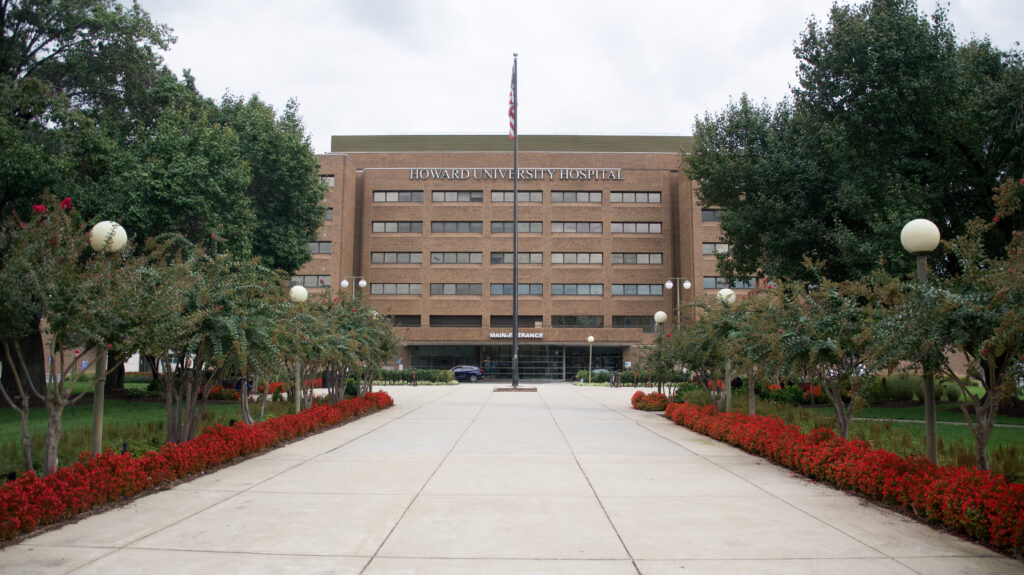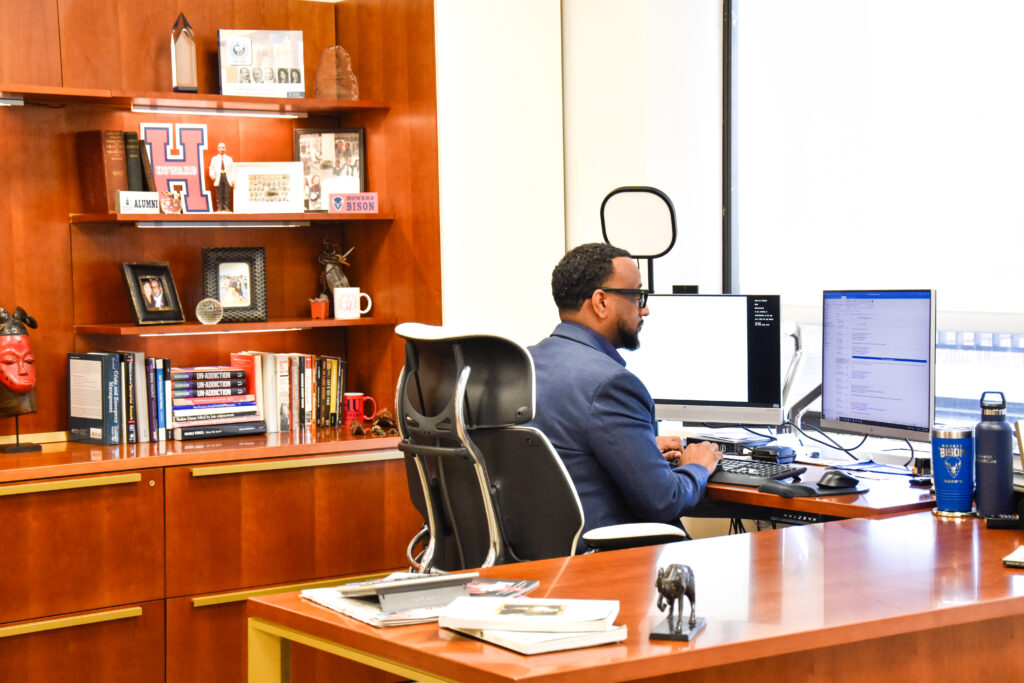
While sitting in his office decorated with degrees and pictures of friends and family, 50-year-old Dr. Roger A. Mitchell Jr. reflected on his past positions and how they prepared him for his new one: president of the Howard University Hospital (HUH).
“It’s a humbling opportunity for me to lead an organization that started in 1862 as Friedman Hospital,” he said. “[The hospital] has trained an innumerable amount of Black and brown minoritized physicians and women physicians.”
With a strong connection to Howard and the D.C. area, Mitchell plans to use his experience to cultivate the hospital, elevating current programs and changing the trajectory of its impact on the surrounding community.
Mitchell, a Class of ‘96 Howard alum, came into his freshman year of undergraduate college wanting to become a physician.
“My grandfather graduated from Howard Medical School in 1932, and my grandmother graduated from the nursing school at Howard in 1936, so I wanted to come to Howard to be a doctor,” he said.
Once hitting his junior year, however, he decided he wanted to go into the workforce instead. Mitchell worked for the FBI as a forensic biologist in the DNA unit in 1997, according to the Office of Energy Justice and Equity. There, Mitchell decided to pursue medicine and attended the University of Medicine and Dentistry of New Jersey Medical School—now known as Rutgers New Jersey Medical School— to become a forensic pathologist.
Mitchell served as the chief medical examiner in Washington, D.C., interim director of the Department of Forensic Sciences and interim deputy mayor for Public Safety & Justice for six months during the pandemic.
Mitchell found himself wanting to do more.
“I really wanted to find myself in a place to prevent the death that I was seeing on a regular basis,” he said.
While on the search for physician executive positions, Mitchell became the chair of pathology for the Howard University College of Medicine (HUCM) in 2021. He said after being in this position for nearly two years, he was asked to become the chief medical officer for outpatient ambulatory care, also known as the faculty practice plan.
He officially entered his position as HUH president on Sept. 13.


Mitchell felt like these experiences cultivated his leadership skills and prepared him for this stage of his career. He used a recent power outage, where a major circuit was hit during the deconstruction of a demolition site, as an example.
The hospital was one of five buildings affected on campus. This issue was brought to Mitchell’s attention on his third day on the job, and he doesn’t think it would’ve been handled so quickly if not for his prior experience.
“Had we not have had the experience of running incident command centers, running crisis intervention, which I’ve had to run as the chief medical officer, I don’t know if we would have gotten through it as well as we did,” he said.
With the help of his team, whom Mitchell emphasized as integral to him doing a good job, the hospital was set to fully run on a generator.
Mitchell is the author of “Death in Custody – How America Ignores the Truth and What We Can Do About It,” co-written by Jay D. Aronson. Mitchell and Aronson discuss the topic of deaths in police custody being considered a “public health issue,” a topic Mitchell has done extensive research on.
Mitchell plans to incorporate his experience and vast knowledge of death in custody as a public health issue by maintaining the centers the hospital already set in place.
“For gun violence, we have a hospital-based violence interruption program here at Howard. We will continue to invest in that program, where individuals that have been injured by guns or knives and have significant trauma are having access to social work and community-based programming,” he said.
He also would like to provide the majority of care for individuals who are coming out of the D.C. jails and are in need of care. He feels there is a great deal of potential for the hospital and plans to truly highlight the quality care the hospital can provide for the entire D.C. community, including students, faculty and staff of Howard.
“There’s this narrative that our brand of community care is only indigent care for those that may not have the resources,” Mitchell said, who was very proud of that idea, “But we want to get the message out that Howard healthcare is for you, it’s for everyone.”

Marjorie C. Gondré-Lewis, PhD—associate dean for faculty development, chief justice, equity, diversity and inclusion officer and professor of anatomy at HUCM—met Mitchell during a research project on neuropsychosocial genomics for the Human Genome Center.
Gondré-Lewis quickly noticed what she considered Mitchell’s strong suit: he was a good communicator with an “ability to read people.”
“He has that ability to connect with individuals and help them imagine what it might be like,” she said. “It’s not just for the patients, but for people in general.”
She also highlighted that although compassionate care is key, Mitchell might face some challenges integrating the “philosophy” aspect with the business aspect of “making the hospital grow.”
Ali Ramadan, associate professor of pathology at HUCM, shared similar sentiments, discussing how Mitchell’s personality and ability to connect with people will take him far in his new position.
“He gives all of himself to his work and wants to make sure we do the best,” he said. “Dr. Mitchell is very enthusiastic, professional with a lot of charisma.”
He reflected on Mitchell’s position as chair of pathology, spotlighting how Mitchell committed to elevating the department and did exactly that.
“He promised he would increase our services, and he did. He is someone that is trustworthy,” he said.
Nathaniel Mitchell, a senior BFA major, felt his father worked very hard throughout his life. He was not surprised to find out he was offered the position.
He said that his father has “something to prove,” mentioning how Dr. Mitchell grew up in a single-parent household, has always had an innate desire to make something of himself and that he’s “continuously utilized to make wherever he is a better place.”

Nathaniel Mitchell also mentioned that his father is “immersed in the culture” and can understand what the hospital would need on a corporate level, but also a community level. He is excited to see the reputation of the hospital changing under his father’s leadership.
Dr. Mitchell also discussed the plans for the new hospital. While programming is still under discussion, Mitchell explained that it would be considered a “pavilion” with many different amenities, including a brand-new emergency department.
Rashad Young, senior vice president and chief strategy officer, said construction is set to be completed in late 2028 in an NBC news article.
In his free time, Mitchell is also a reverend and online associate pastor of the New Bethel Baptist Church on 1739 9th St. He said his faith is an integral part of who he is and how he leads his life.
“My faith and my family are first, and my community, so those are the kind of order I’ve been centering my faith [in]. So all decisions I make, I consult my faith,” he said. “How I show up with my colleagues, how I lead, pretty much every aspect of my life.”
Copy edited by Jalyn Lovelady
































